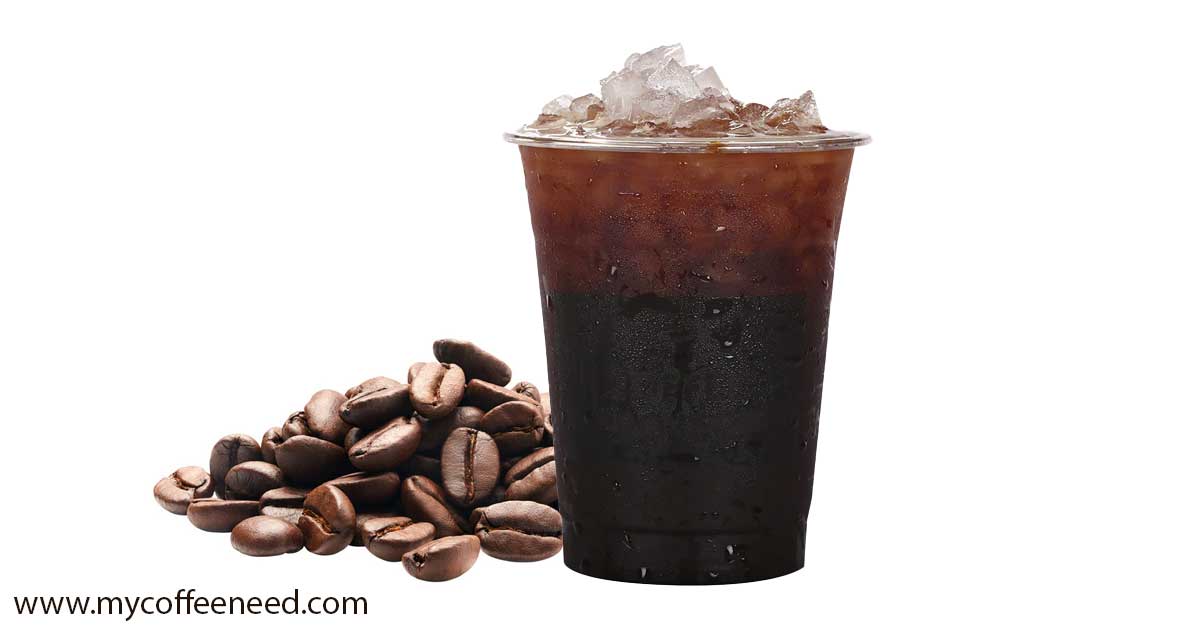Does Instant Coffee Dissolve in Cold Water?
The answer is Yes, instant coffee does dissolve in cold water. However, it typically dissolves faster and more fully in hot water due to the heat’s effect on the dissolution process. In cold water, you might have to stir it more vigorously or for a longer period to completely dissolve the instant coffee. It’s also worth noting that the flavor may be slightly different when you use cold water instead of hot.
What Is Instant Coffee and How Does It Dissolve in Cold Water?
Instant coffee is a type of coffee that is made from pre-brewed coffee beans that have been freeze-dried or spray-dried into a fine powder. This powder can be dissolved in hot or cold water, making it a convenient and quick way to get your caffeine fix.
The only difference between regular coffee and instant coffee is that the beans used to make instant coffee have been pre-brewed and then dried into a powder. This powder can then be dissolved in hot or cold water to make a cup of coffee. The temperature of the water will determine how quickly the coffee dissolves, with hot water being the best option for a more flavorful cup of coffee.
When it comes to dissolving instant coffee in cold water, the process is slightly different. The cold water will take longer to dissolve the coffee granules, so it’s best to use a cup of room temperature water and then add a few ice cubes to make a cold cup of coffee. You can also add a teaspoon of brown sugar or maple syrup to make a more flavorful cup of cold coffee.
The best part about instant coffee is that it’s much more convenient than regular coffee, as it only takes a matter of minutes to make a cup of coffee. It’s also a great option for coffee lovers who are short on time or don’t have access to a coffee shop. The main difference between instant coffee and regular coffee is the caffeine content, as instant coffee usually has less caffeine than regular coffee.
Overall, instant coffee is a great option for coffee lovers who are looking for a quick and convenient way to get their caffeine fix. The only difference between regular coffee and instant coffee is the brewing process, and the best way to make a cup of cold instant coffee is to use a cup of room temperature water and then add a few ice cubes. For a more flavorful cup of cold instant coffee, you can also add a teaspoon of brown sugar or maple syrup.
What Are the Benefits?
Instant coffee is a great option for coffee lovers who don’t have the time or patience to brew a pot of regular coffee. The only difference between instant coffee and regular coffee is that the former is made from pre-brewed coffee extract that has been spray dried into a fine powder. The main ways to make instant coffee are to dissolve it in hot water, cold water, or a combination of both.
When instant coffee is dissolved in cold water, it can provide a quick and convenient way to get a caffeine fix. The dissolving process is much faster than with hot water, and the result is a cup of cold coffee that can be enjoyed right away. The best part is that the temperature of the water does not affect the flavor profile of the coffee, so you can enjoy a much more flavorful cup of cold instant coffee than if you used hot water.
The main benefit of using cold water to dissolve instant coffee is that it has a lower caffeine content than hot water. This means that if you’re looking for a caffeine fix but don’t want to consume too much coffee, cold water is a good idea. Additionally, cold water can help bring out the subtle flavors of the instant coffee, making it a much more enjoyable experience.
When making cold instant coffee, you can use a variety of different ways to sweeten it. Brown sugar, maple syrup, and cane sugar are all good options. If you’re looking for a cold beverage that’s not as sweet, you can also use a cup of cold milk or even a cup of cold water.
Overall, the benefits of instant coffee dissolving in cold water are numerous. It’s a great way to get a caffeine fix without having to brew a pot of regular coffee, and it can also be used to make a variety of cold drinks. The best way to make sure you get the perfect cup of cold instant coffee is to use the right type of coffee, the right amount of instant coffee granules, and the right water temperature. With a little practice, you’ll be able to make a delicious cup of cold instant coffee in no time.
How Does the Temperature of Water Affect the Dissolution of Instant Coffee?
Temperature plays an important role in the dissolution of instant coffee. When it comes to making a cup of coffee, the temperature of the water is a crucial factor. Hot water is typically used to dissolve instant coffee granules, but cold water can also be used. Coffee beans are ground to make regular coffee, while instant coffee is made from coffee crystals, coffee extract, or spray-dried coffee.
When making hot coffee, the temperature of the water is key. Hot water helps the instant coffee dissolve quickly, resulting in a more flavorful cup of coffee. However, if the water is too hot, the coffee can become bitter. Cold water can also be used to make cold coffee, such as cold brew coffee or iced coffee. Cold water takes longer to dissolve the instant coffee, resulting in a less flavorful cup of coffee.
For those who want a caffeine fix but don’t have time to make a hot cup of coffee, cold instant coffee is a great option. The only difference between hot and cold instant coffee is the temperature of the water used. Cold instant coffee has less caffeine than hot instant coffee, but it still provides a good dose of caffeine.
The best part about making instant coffee is that there are a variety of ways to do it. Whether you use hot or cold water, adding a bit of brown sugar or maple syrup can make for a more flavorful cup of coffee. Another good idea is to fill an ice cube tray with instant coffee and then add a cup of cold water. This will result in a cold instant coffee that can be used to make cold drinks such as cold milk or a cup of cold water.
In conclusion, the temperature of the water used to dissolve instant coffee can make a big difference in the taste of the coffee. Hot water helps the instant coffee dissolve quickly, resulting in a more flavorful cup of coffee. Cold water takes longer to dissolve the instant coffee, resulting in a less flavorful cup of coffee. For those who want a caffeine fix but don’t have time to make a hot cup of coffee, cold instant coffee is a great option.
What Factors Influence the Rate of Dissolution?
When it comes to getting a caffeine fix, coffee lovers have a variety of ways to enjoy their favorite beverage. The only difference between regular coffee and instant coffee is that the latter is made from pre-brewed coffee extract, which is then dried into a powder or crystals. This makes it easier to dissolve in water, allowing for a quick and convenient way to make a cup of coffee.
When it comes to the rate of dissolution of instant coffee in cold water, there are several factors that come into play. The temperature of the water is one of the main factors, as cold water molecules move more slowly than hot water molecules, making it more difficult for the coffee to dissolve. Additionally, the type of coffee, the particle size of the instant coffee granules, and the amount of coffee used can all affect the rate of dissolution. For example, using a finer powder of instant coffee or using more coffee will increase the rate of dissolution.
In addition to the temperature of the water, other ingredients can also affect the rate of dissolution. For example, adding brown sugar, maple syrup, or other sweeteners can help the coffee dissolve faster. However, it is important to note that these ingredients can also alter the flavor profile of the coffee, so it is best to experiment with different amounts to find the desired taste.
Finally, the packaging of the instant coffee can also influence the rate of dissolution. If the coffee is stored in an airtight container, it will stay fresher for a longer period of time, which can help the coffee dissolve faster.
In conclusion, there are a variety of factors that influence the rate of dissolution of instant coffee in cold water. The temperature of the water, the type of coffee, the particle size of the instant coffee granules, the amount of coffee used, and the packaging of the instant coffee can all affect the rate of dissolution. By experimenting with different amounts and types of ingredients, coffee lovers can find the perfect cup of cold instant coffee that will provide them with a much needed caffeine fix.
What Are the Chemical Properties of Instant Coffee That Allow It to Dissolve in Cold Water?
Instant coffee is a popular choice for coffee lovers who are looking for a quick caffeine fix. The only difference between regular coffee and instant coffee is the way it is prepared. Regular coffee is made by grinding coffee beans and brewing them with hot water. On the other hand, instant coffee is made by extracting the flavor from the coffee beans and then drying the extract into a powder or granules. This allows instant coffee to dissolve in cold water, making it a great option for cold drinks and coffee lovers who don’t have the time to brew a cup of hot coffee.
The chemical properties of instant coffee that allow it to dissolve in cold water depend on the type of coffee, the temperature of the water, and the particle size of the instant coffee granules or powder. For example, coffee crystals dissolve more quickly in hot water than in cold water. However, instant coffee granules or powder dissolve more quickly in cold water than in hot water. This is because the cold water molecules are more active and can break down the coffee particles more quickly.
In addition, the type of coffee used to make instant coffee can also affect the dissolving process. For example, instant coffee made from Arabica beans will dissolve more quickly than instant coffee made from Robusta beans. The particle size of the instant coffee also plays a role in how quickly it dissolves. Instant coffee that is ground into a fine powder will dissolve more quickly than instant coffee that is in the form of granules.
Finally, the temperature of the water can also affect how quickly the instant coffee dissolves. Hot water will dissolve the coffee particles more quickly than cold water, but the flavor of the coffee will be less intense. On the other hand, cold water will take longer to dissolve the coffee particles, but the flavor of the coffee will be more intense.
Overall, the chemical properties of instant coffee that allow it to dissolve in cold water depend on the type of coffee, the temperature of the water, and the particle size of the instant coffee granules or powder. By understanding these factors, coffee lovers can make a more flavorful cup of cold instant coffee the next time they need a caffeine fix.
What Are the Advantages of Instant Coffee Dissolving in Cold Water Over Other Types of Coffee?
Instant coffee is a convenient way for coffee lovers to get their caffeine fix without having to wait for a hot brew. The only difference between regular coffee and instant coffee is that the latter dissolves in cold water. This means that you can make a cup of cold coffee with just a few simple steps.
Instant coffee is made from coffee beans that have been ground and then brewed with hot water. The coffee extract is then spray dried and turned into instant coffee granules or crystals. This process makes it easier for the coffee to dissolve in cold water, unlike regular coffee which needs hot water to dissolve.
When making a cup of cold instant coffee, the temperature of the water is important. Cold water will not dissolve the coffee as quickly as hot water, so it is best to use room temperature or warm water. If you want to make a cold drink, you can use ice cubes or a cup of cold milk.
The best part about making cold instant coffee is that you can use a variety of sweeteners such as brown sugar, maple syrup, or cane sugar. This will add flavor to your cup of cold coffee and make it more enjoyable.
The main difference between cold instant coffee and regular coffee is the caffeine content. Instant coffee has less caffeine than regular coffee, so it is a good idea to use less coffee if you want a less intense caffeine fix.
Overall, cold instant coffee is a great option for those who lack the time or equipment to make a hot brew. It is also a convenient way to make cold beverages such as iced coffee. The only downside is that instant coffee tastes different than regular coffee, so it may not be the best choice for coffee aficionados. However, if you are looking for a quick and easy way to make a cup of cold coffee, instant coffee is a great option.
How Does the Amount of Instant Coffee Affect Its Dissolution in Cold Water?
The amount of instant coffee used in cold water affects its dissolution rate and the flavor of the final cup of coffee. Instant coffee is a type of coffee that is made from coffee beans that have been brewed and then dried into a powder or granules. The only difference between regular coffee and instant coffee is that the latter is made with hot water instead of cold.
When instant coffee is dissolved in cold water, the temperature of the water affects the rate at which the coffee dissolves. Cold water does not dissolve the coffee granules as quickly as hot water, and the flavor of the coffee will be less intense. For coffee lovers who want a quick caffeine fix, a cup of cold instant coffee is a good idea. However, the caffeine content will be lower than that of hot coffee, so it may not be enough to satisfy a caffeine craving.
Another factor that affects the dissolution rate of instant coffee in cold water is the type of coffee used. Some instant coffee packaging contains a blend of Arabica beans and Robusta beans, while others contain only Arabica beans. Arabica beans have a more flavorful cup of coffee, so they will dissolve faster in cold water than Robusta beans.
The particle size of the instant coffee also affects the rate at which it dissolves in cold water. If the particles are too large, they will take longer to dissolve. On the other hand, if the particles are too small, they will dissolve too quickly and the flavor of the coffee will be weaker.
Finally, the amount of instant coffee used in cold water also affects its dissolution rate. If too much coffee is used, it will take longer to dissolve and the flavor of the coffee will be weaker. On the other hand, if too little coffee is used, the flavor of the coffee will be too strong.
In conclusion, the amount of instant coffee used in cold water affects its dissolution rate and the flavor of the final cup of coffee. Coffee lovers should experiment with different amounts of instant coffee to find the perfect cup of coffee. Additionally, using hot water instead of cold water is a great way to make a more flavorful cup of coffee.
What Are the Potential Health Benefits?
Instant coffee is a convenient and quick way for coffee lovers to get their caffeine fix. It is made by extracting the flavor and caffeine from coffee beans and then spray drying the extract into a fine powder. The only difference between regular coffee and instant coffee is that the latter dissolves in cold water. This makes it ideal for making cold coffee drinks like iced coffee or cold brew coffee.
Krups Coffee Grinder
The health benefits of instant coffee dissolving in cold water depend on the type of coffee, the temperature of the water, and the amount of coffee used. For example, if you use hot water, the coffee crystals will dissolve more quickly and the caffeine content will be higher. If you use cold water, the coffee will take longer to dissolve and the caffeine content will be lower.
The best part about using instant coffee to make cold drinks is that you can adjust the flavor profile by adding different ingredients like brown sugar, maple syrup, or even a few ice cubes. This makes it easy to create a variety of cold beverages that are both delicious and healthy.
Another great way to get the most out of instant coffee is to use it to make cold brew coffee. This involves steeping ground coffee in cold water for a long time, usually 12-24 hours. The result is a much more flavorful cup of coffee with a lower caffeine content than regular instant coffee.
Finally, if you’re looking for a quick and convenient way to get your caffeine fix, instant coffee is a great option. All you need is a cup of cold water and a packet of instant coffee. The coffee will dissolve in the water in a matter of minutes, giving you a perfect cup of cold coffee.
In short, the potential health benefits of instant coffee dissolving in cold water are numerous. From providing a convenient way to get your caffeine fix to creating delicious cold drinks, instant coffee is a great option for coffee lovers.
How Does the Type of Instant Coffee Affect Its Dissolution in Cold Water?
The type of instant coffee used can have a significant effect on its dissolution in cold water. Instant coffee is made by grinding coffee beans and then extracting the flavor and caffeine from them. The extract is then dried into a powder or granules, which can be dissolved in hot or cold water.
When it comes to cold water, the only difference between regular coffee and instant coffee is that the latter is already in a powdered or granulated form. This makes it easier to dissolve in cold water, but it also means that the flavor and caffeine content of the coffee can be affected.
When it comes to cold water, the temperature of the water can affect how quickly the instant coffee dissolves. If the water is too cold, the coffee crystals may not dissolve as quickly, resulting in a less flavorful cup of coffee. On the other hand, if the water is too hot, the coffee crystals may dissolve too quickly, resulting in a bitter cup of coffee.
The type of instant coffee used can also affect its dissolution in cold water. For example, instant coffee made from Arabica beans tends to dissolve more quickly than instant coffee made from Robusta beans. Instant coffee made from Arabica beans also tends to have a more flavorful taste than instant coffee made from Robusta beans.
The type of sweetener used can also affect the dissolution of instant coffee in cold water. For example, brown sugar tends to dissolve more quickly than cane sugar, while maple syrup tends to dissolve more slowly than both.
In conclusion, the type of instant coffee used can have a significant effect on its dissolution in cold water. The temperature of the water, the type of coffee used, and the type of sweetener used can all affect the dissolution process. Coffee lovers can experiment with different ways to make a good cup of cold coffee, such as using room temperature water, cold milk, or a cup of cold water with a few ice cubes. For those who need a quick caffeine fix, instant coffee is a great option, but it is important to remember that the type of instant coffee used can have a big impact on the flavor and caffeine content of the coffee.
What Are the Potential Environmental Benefits?
Instant coffee has the potential to offer a variety of environmental benefits. When instant coffee is dissolved in cold water, it eliminates the need for hot water, which can save energy. Additionally, since instant coffee is already ground, it eliminates the need for coffee beans and the energy required to grind them. Furthermore, the instant coffee granules dissolve quickly in cold water, so there is no need to wait for the temperature of the water to cool down. This can also save energy.
Instant coffee can also be used to make cold coffee, which is a popular choice for coffee lovers during the summer months. The only difference between cold brew coffee and regular coffee is that cold brew coffee is made with cold water, while regular coffee is made with hot water. This eliminates the need for ice cubes, which can also save energy.
Another potential environmental benefit of instant coffee is that it has a lower caffeine content than regular coffee. This means that it takes less coffee to get a caffeine fix, which can help reduce the amount of coffee used. Additionally, instant coffee is often packaged in airtight containers, which can help reduce the amount of packaging waste.
Finally, instant coffee can be used in a variety of ways to make cold drinks, such as iced coffee and cold milk. This is a great option for coffee lovers who don’t have time to make a hot brew. The best part is that instant coffee tastes just as good as regular coffee, so there is no need to sacrifice flavor.
Overall, instant coffee has the potential to offer a variety of environmental benefits. By eliminating the need for hot water, coffee beans, and ice cubes, it can save energy. Additionally, its lower caffeine content and convenient packaging can help reduce the amount of coffee and packaging waste. Finally, it can be used to make a variety of cold drinks, making it a great option for coffee lovers who don’t have time to make a hot brew.
What Are the Different Methods of Preparing?
Preparing instant coffee in cold water is a great way to get a caffeine fix without having to wait for a hot brew. The only difference between regular coffee and instant coffee is the type of coffee beans used and the temperature of the water used. Instant coffee is made from ground coffee beans that have been spray dried, resulting in a fine powder. The particles are so small that they dissolve quickly in cold water, making it a convenient way to get a caffeine fix.
When making cold instant coffee, the first step is to dissolve the instant coffee granules or powder in a cup of cold water. Depending on the type of instant coffee you use, you may need to add a little milk or brown sugar to make it more flavorful. For a cold brew coffee, it is best to use room temperature water, as the cold water can affect the flavor profile.
The next step is to add ice cubes to the cup of cold water and instant coffee. This will help to cool the drink down and give it a refreshing taste. If you want a more flavorful cup of coffee, you can also add maple syrup or cane sugar to the mix.
Once the instant coffee has dissolved in the cold water, you can enjoy your cold coffee. If you want a caffeine fix, you can add more instant coffee granules or powder to the cup of cold water. However, it is important to note that instant coffee has less caffeine than regular coffee, so you may need to use more of it to get the same caffeine content.
For those who are looking for a quick way to make cold instant coffee, there are a variety of instant coffee packaging options available. Starbucks Premium Instant Coffee is a popular brand that is easy to use and comes in a variety of flavors. All you need to do is add the instant coffee powder to a cup of cold water and stir until the coffee crystals dissolve.
No matter which method you choose, making cold instant coffee is a great way to get a caffeine fix without having to wait for a hot brew. The best part is that you can experiment with different ways to make cold instant coffee and find the perfect cup of cold coffee for you.
How Does the Addition of Other Ingredients Affect the Dissolution?
The addition of other ingredients can have a significant effect on the dissolution of instant coffee in cold water. For instance, when instant coffee granules are added to hot water, the temperature of the water helps to dissolve the coffee crystals quickly. On the other hand, when instant coffee is added to cold water, the dissolving process takes longer. In addition, coffee lovers can add ground coffee beans, instant coffee powder, brown sugar, maple syrup, or other ingredients to cold water to make a more flavorful cup of coffee.
The only difference between regular coffee and instant coffee is that the latter is made by spray drying ground coffee beans. This process reduces the caffeine content in the coffee, so it is a good idea to add more instant coffee granules to cold water if you are looking for a caffeine fix. Cold brew coffee is made by steeping coffee grounds in cold water for a long time, so it is not the same as instant coffee.
When making a cup of cold coffee, the type of coffee, the temperature of the water, and the amount of coffee used are all important factors. For example, if you are using instant coffee powder, it is best to use cold or room temperature water. Hot water can make the instant coffee dissolve too quickly, resulting in a bitter taste. Adding ice cubes to a cup of cold water is also a good idea, as it can help to keep the temperature of the water low.
The best part about making cold instant coffee is that it is a convenient way to get your caffeine fix. You can store instant coffee in an airtight container and make a cup of cold coffee in a matter of minutes. Coffee aficionados can also make a cold brew by steeping coffee grounds in cold water for a long time.
In conclusion, the addition of other ingredients can affect the dissolution of instant coffee in cold water. Hot water can make the instant coffee dissolve too quickly, while cold water can make the dissolving process take longer. Adding ground coffee beans, instant coffee powder, brown sugar, maple syrup, or other ingredients to cold water can make a more flavorful cup of coffee. Cold brew coffee is also a great option for coffee lovers who want a strong caffeine fix.







